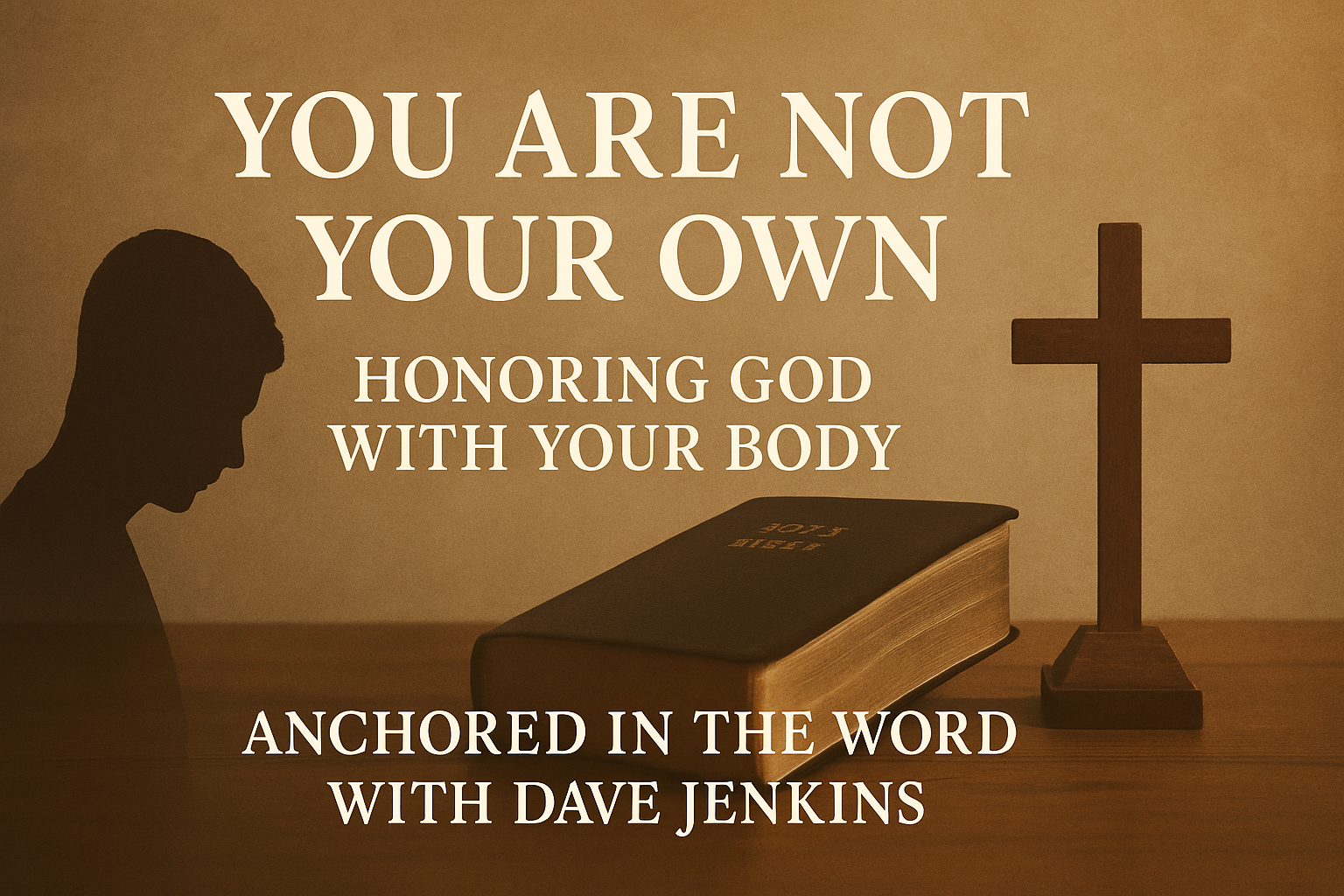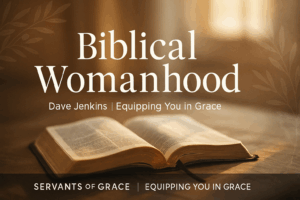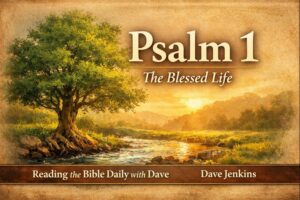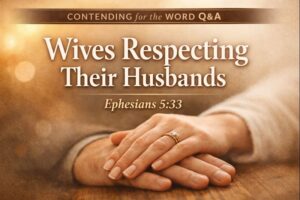⏱️ Estimated Reading Time: 5 min read
Podcast: Play in new window | Download | Embed
Subscribe Apple Podcasts | Spotify | Amazon Music | Pandora | Email
You Are Not Your Own: What Scripture Says About Our Bodies with Dave Jenkins
From Genesis to the New Testament, Scripture affirms that our bodies are not our own—they were created by God, redeemed by Christ, and are to be used for His glory. Dave unpacks the doctrines of creation and redemption, challenges the lie of autonomy, and provides practical wisdom for living in a way that honors the Lord with our physical bodies.
This message is a biblical and theological call to surrender, holiness, and worship in a world obsessed with self.
▶️ Audio Player
🎥 Video Player
🔗 Calls to Action
🎧 Listen to more episodes of Anchored in the Word:
https://servantsofgrace.org/anchored-in-the-word/
❓ Submit your question for a future episode:
https://servantsofgrace.org/contact-4/
📖 Learn more: 1 Corinthians 6:19–20 on Bible Gateway
📖 Read the Full Article Below
You Are Not Your Own: Honoring God with Your Body
In today’s culture, the phrase “My body, my choice” is a rallying cry used to defend personal autonomy, particularly in matters of sexuality, identity, and abortion. This mantra elevates self-rule and bodily sovereignty as the highest goods. But does this worldview align with the teaching of Scripture? As Christians, we must ask not what the culture affirms, but what God has revealed.
What Does the Bible Say About Our Bodies?
From the very beginning of Scripture, we are taught that our bodies are not our own. Genesis 1:26–27 tells us that God created humanity in His image—male and female. That means our bodies are not accidental or meaningless. They were designed with intentionality to reflect God’s glory.
Paul writes in 1 Corinthians 6:19–20, “You are not your own, for you were bought with a price. So glorify God in your body.” This powerful statement reframes the human body not as a personal possession, but as a temple of the Holy Spirit—purchased by the blood of Christ. We are stewards, not owners.
Romans 12:1 reinforces this truth: “Present your bodies as a living sacrifice, holy and acceptable to God, which is your spiritual worship.” Christian worship includes not just what we believe or sing but how we live and use our bodies daily.
Theological Foundations: Creation and Redemption
At the core of bodily autonomy is the question of ownership. Scripture provides two clear answers: God owns our bodies by right of creation and by right of redemption.
Psalm 139:13–16 tells us that God formed us in the womb. Our existence is not self-determined; it is God-ordained. To claim total control over our own bodies is to reject God’s intimate role as Creator.
But not only did God make us, He also redeemed us. Through Jesus’ sacrificial death and bodily resurrection, we are redeemed—body and soul. As Paul explains in 1 Corinthians 6:13, “The body is not meant for sexual immorality, but for the Lord, and the Lord for the body.”
In a biblical worldview, bodily autonomy is not ultimate. Surrender to God is.
Practical Implications for Christian Living
- Self-Control
Galatians 5:16–17 calls believers to “walk by the Spirit” and not gratify the desires of the flesh. A culture that chants, “My body, my choice” often promotes indulgence and self-will. Scripture calls for self-control and Spirit-empowered discipline. - Sanctity of Life
The slogan “my body, my choice” is often used to justify abortion. But Psalm 139 affirms that life begins in the womb and is God’s handiwork. We are not the authors of life, and we have no right to end what God has begun. - Serving Others
1 Corinthians 6 reminds us that glorifying God in our bodies means rejecting self-centered living. Christians are called to use their bodies in service to others—to love our neighbors, build up the church, and reflect Christ’s humility.
Frequently Asked Questions (FAQ)
What does the Bible say about bodily autonomy?
The Bible teaches that our bodies are not our own. We were created in God’s image (Genesis 1:26–27), redeemed by Christ (1 Corinthians 6:19–20), and are to glorify God in body and soul. Christian autonomy is ultimately about surrender to God, not self-rule.
How should Christians respond to the phrase “my body, my choice”?
Christians should respond with biblical clarity, showing that our bodies are not for self-indulgence or autonomy but for holiness and worship. Scripture calls us to offer our bodies as living sacrifices (Romans 12:1) and to honor God in how we live.
Does the Bible affirm the sanctity of life in the womb?
Yes. Psalm 139:13–16 affirms that God forms life in the womb and that every human life is a work of divine craftsmanship. Life is sacred from conception, and ending it is a rejection of God’s creative authority.
Conclusion: Living Sacrifices, Not Autonomous Beings
The cultural narrative of bodily autonomy is seductive, but it is ultimately a lie. True freedom is not found in doing whatever we want with our bodies. True freedom is found in surrendering our bodies to the One who made and redeemed them.
As Christians, we are not our own. We were bought with a price. Therefore, let us glorify God in our bodies as living sacrifices, holy and acceptable to Him.
❓ Submit a question for a future episode: Contact Us
Thank you for listening or watching this episode of Anchored in the Word with Dave.
Dave Jenkins is happily married to his wife, Sarah. He is a writer, editor, and speaker living in beautiful Southern Oregon. Dave is a lover of Christ, His people, the Church, and sound theology. He serves as the Executive Director of Servants of Grace Ministries, the Executive Editor of Theology for Life Magazine, the Host and Producer of Equipping You in Grace Podcast, and is a contributor to and producer of Contending for the Word. He is the author of The Word Explored: The Problem of Biblical Illiteracy and What To Do About It (House to House, 2021), The Word Matters: Defending Biblical Authority Against the Spirit of the Age (G3 Press, 2022), and Contentment: The Journey of a Lifetime (Theology for Life, 2024). You can find him on Facebook, Twitter, Instagram, Youtube, or read his newsletter. Dave loves to spend time with his wife, going to movies, eating at a nice restaurant, or going out for a round of golf with a good friend. He is also a voracious reader, in particular of Reformed theology, and the Puritans. You will often find him when he’s not busy with ministry reading a pile of the latest books from a wide variety of Christian publishers. Dave received his M.A.R. and M.Div through Liberty Baptist Theological Seminary.




